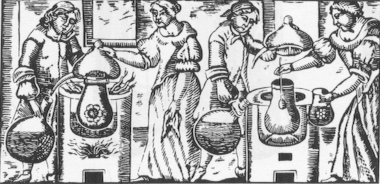Alchemy
Today, we remember alchemy. The University of Houston's College of Engineering presents this series about the machines that make our civilization run, and the people whose ingenuity created them.
In 1859, poet George Meredith wrote,
See ye not, Courtesy Is the true alchemy,
Turning to gold all it touches and tries?
He wrote that just as the last ghosts of the old alchemy evaporated from science. He calls up our first impression of alchemy: that it's the way quasi-magicians try to turn lead into gold.
Alchemy was what we called the study of chemistry from the 3rd century BC until 150 years ago. The word probably comes from the Greek chemeia, which meant to transmute or change matter. That's what alchemy, like modern chemistry, has always been about.
What we call alchemy took form when Aristotle adopted an older idea that all matter combined the four essences of earth, air, fire and water. He guessed that these elements could be changed (transmuted) by the action of heat and cold, or dampness and dryness.
The Greeks developed Aristotle's ideas. Then Arab scientists took up alchemy. From time to time, it became pretty metaphysical. The practical Romans had no taste for it at all. As Roman civilization spread, alchemy practically vanished until the 13th century, when scholars began rereading the old Greek and Arabic texts.
Of course, alchemy promised great wealth to anyone who figured out how to transmute lesser metals into gold. It may seem a waste that so many alchemists devoted their lives to transmutation, but the spin-off was enormous. By trying to understand transmutation, they created practical metallurgy and learned process chemistry. (Of course, they reported their ideas in terms alien to our ears.)
In the late 1600s, alchemists decided matter was made of only three elements, now called "earths." Vitreous earth gave solidity to matter; fluid earth gave it liquidity; and fatty earth (later called phlogiston) gave it combustibility. These were the old Aristotelian elements: earth, water and fire - without air! By now, they figured air to be inert -- not a component of matter.
All the while, an increasingly analytical science was being built on these notions. By the 1780s, scientists saw that heat was not a part of matter at all. So they replaced phlogiston with yet another invisible Aristotelian essence called caloric. Caloric merely occupied matter, and it flowed from hot bodies to cold.
Even after the atomic theory of matter replaced the various earths, scientists were still using caloric to describe heat when my grandfather was born. The alchemical view of matter didn't completely give way to an atomic theory until the 1850s.
So before you write alchemy off as voodoo, remember its staying power. Modern quantum physics seems to be steering us back toward alchemical-like essences today. And, in the early 1700s, just as the old alchemy was unraveling, Matthew Green reminded us of the inevitability of transmutation when he wrote,
By happy alchemy of mind
They turn to pleasure all they find.
I'm John Lienhard, at the University of Houston, where we're interested in the way inventive minds work.
(Theme music)
A great deal has been written about alchemy. The Encyclopaedia Britannica makes an excellent starting point. You may also use the SEARCH function for this site to find many other references to alchemy.
This is a greatly revised version of Episode 76.
